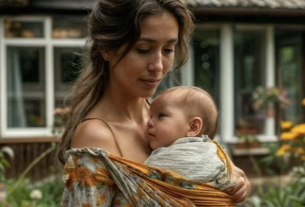“So, shall we settle on that Italian place with the veranda?” Anya lazily slid her finger across the laptop screen, scrolling through photos of a sun-drenched hall. “I think it’s perfect. Our parents, Katya and Igor, and us. Six people. Cozy, no pomp—just like we wanted.”
She said it with a light, almost purring intonation, full of confidence in their shared, long-ago decision. Their apartment—their small, cozy cocoon—seemed steeped in that mood. The smell of freshly brewed coffee mingled with the scent of her perfume, and in the rays of the evening sun filtering through the clean glass, dust motes danced. Everything was in its place. Their future looked as clear and orderly as the tabs in her browser: “restaurants for an intimate wedding,” “photographer for two hours,” “white sheath dress.”
“Yes, of course, darling. Whatever you say,” Pavel, sitting opposite, nodded a bit faster than necessary and glanced away. He rubbed the back of his head—a gesture that always meant a slight inner tension for him. “The veranda is great.”
Anya didn’t think anything of it. The last few weeks had been hectic, and she chalked his distraction up to ordinary fatigue. She was happy. Happy that they both wanted the same thing: a quiet, genuine celebration for themselves, not a show for a crowd of barely familiar people. She was sure their relationship was built on that shared foundation—the ability to hear each other and separate what mattered from what was superficial and showy. That quicksilver anticipation of a simple, elegant celebration filled her with energy.
At that moment the key turned in the lock. Pavel flinched as if the sound were deafening. Anya raised her eyebrows at him in surprise, but he was already getting up from the table and heading to the hallway. He returned a minute later. In his hands was a thin folder, and on his face played a strange smile—guilty and ingratiating at once. She had seen that smile only once before, when he confessed he had accidentally washed her silk dress with his jeans.
He came up to the table in silence and set the folder down in front of her. Without opening it—just set it down. Anya looked at him, then at the folder, then at him again, waiting for an explanation. He only shrugged vaguely and stepped over to the window, pretending to be extremely interested in the view of the neighboring building.
With mild perplexity she opened the folder. Inside lay several A4 sheets filled top to bottom with a small, almost calligraphic hand. They weren’t paragraphs of text. They were columns. Numbered columns of first and last names. Aunt Lyuba from Syzran. Her cousin Oleg with his wife and three children. Her mother’s colleague Maria Stepanovna. The Nikiforov family, her parents’ friends from Saratov. And so on, and so on. She skimmed the first page, then the second. The count ran into dozens.
Anya slowly raised her head from the papers. The air in the kitchen was no longer cozy. It had become thick, viscous, and held a distinct smell of someone else’s will.
“What is this?” she asked. Her voice was even, but it no longer held a trace of the relaxed tenderness that had reigned here five minutes earlier. She already knew the answer. She just wanted to hear him say it.
“It’s… Mom made a list,” Pavel finally tore himself from the window but still didn’t dare come closer. He stayed standing two meters from the table, in the half-light, as if instinctively seeking cover. “She says we have to invite everyone so no one will be offended.”
His voice was quiet and somehow flat, devoid of any conviction. He wasn’t defending a position; he was conveying it, like a postman delivering bad news for which he bears no responsibility. That detachment enraged Anya much more than if he had started shouting to prove he was right. She slowly laid her palm on the sheets, as if trying to hold them down on the table, not let this brazen, alien incursion spread across their entire kitchen, their entire life.
“Pasha, we had an agreement,” she said, enunciating each word. There was no pleading in her voice, only a cold statement of a fact he had apparently forgotten. “City hall ceremony. Dinner for the closest people. Six of us. We’ve discussed it for three months. We chose a restaurant. We don’t have the money for a banquet for your entire Saratov region. And more importantly, we don’t want one.”
He hesitated, shifting from foot to foot. The simple, logical argument that had once been an axiom for both of them had now turned into an obstacle he needed somehow to get around.
“Come on, Anya…” he began in his most persuasive tone, the one that always worked when he asked her for some small favor. “Mom says it’s important for the family’s reputation. That it’s the way it should be. It’s once in a lifetime. She thinks it’ll show everyone how much they value me. How they accept you… Otherwise they won’t accept you.”
The last sentence came out almost in a whisper, but it hit Anya like a slap. There it was. It wasn’t about reputation or nameless relatives’ hurt feelings. This was an entry pass. A ticket into their family, the price of which was the complete renunciation of her own opinion, her own wishes, their joint plans. She looked at those neatly written pages and saw not a guest list but a detailed rule book for a monastery she was being invited to join. Each name, rendered in tidy maternal script, wasn’t just a line. It was a little soldier in a foreign army being arrayed against her alone.
“Is your mother going to pay for this banquet?” she asked just as evenly. “Is she going to find a restaurant that’ll take two hundred people in two weeks? Will she handle all the logistics? Because I’m not going to. And I’m not going to spend our shared savings—the ones we’ve been putting aside for a down payment—on a feast for people I’ve never met.”
Pavel winced as if she’d said something indecent. Talking about money always made him uncomfortable, especially when he was on the losing side.
“What do money have to do with it? It’s about respect! You just don’t want to understand that this is important to them. It’s tradition! It’s what they’re used to!”
“It’s their tradition, Pasha. Not ours,” she cut him off. “You and I had a different agreement. You agreed to it. Or have you been lying to me all these months?”
“I didn’t lie to you,” his voice gained hardness, but it wasn’t his own firmness—it was borrowed. He took a step forward, out of the shadows, and now the light from the window fell on his angry face. “I was just hoping you’d show wisdom. That you’d understand family isn’t just the two of us. It’s compromise. It’s knowing how to meet people halfway.”
He was speaking in stock phrases, and Anya could almost physically feel the invisible figure of his mother behind him, putting these correct, deadly words in his mouth. Compromise. What a convenient word to describe a one-sided concession.
“Compromise is when both sides give something up, Pasha. When we both look for a solution that works for both of us. What you’re proposing”—she nodded at the sheets on the table—“isn’t a compromise. It’s an ultimatum. I’m being told the conditions on which I’ll be allowed into your family. And those conditions are a complete rejection of the decision we made together.”
“Oh stop with your ‘decision, decision’!” he began to wind up; his calm cracked, revealing confusion and anger. “It’s just a wedding! One day! Is it really so hard to do something nice for my mother, for my relatives? They aren’t asking you to sell your soul! They just want to meet my wife and share our joy! And you’re acting like a selfish woman who only thinks about herself!”
Selfish. There it was. The main accusation, the trump card saved for the moment when logic stops working. He struck right at the target, but the effect wasn’t what he expected. Nothing stirred inside Anya. On the contrary, everything froze, crystallizing into a cold, clear certainty. She looked at him—the man she loved, the man she was going to marry—and saw not a kindred soul but a relay for someone else’s thoughts and desires. He wasn’t on her side. He wasn’t even in the middle. He had long since been standing over there, on the other shore, and was now simply coaxing her to swim over to him, leaving on this shore everything she considered her own.
At that moment she understood that it wasn’t about the wedding. Not even about his mother. It was about him. About his inability to be a man, a partner, a separate entity. About his readiness, in any contentious matter, always to choose not their shared little boat but the big, reliable maternal liner. And now he was simply offering her a berth in the hold.
“If I give in now, Pasha, it won’t end. It’ll only begin,” she said quietly, but in the empty kitchen each word sounded like a hammer strike on an anvil. “First, the wedding according to your mother’s script. Then we’ll pick an apartment where it’s convenient for your mother. Then we’ll name our children based on the names your mother likes. And each time you’ll come to me with this same expression and say it’s ‘just necessary,’ that we need to ‘show respect.’ I don’t want that kind of life.”
“You’re exaggerating!” he exclaimed, but panic had already crept into his voice. He realized he was losing control. “It’s just a concession! A small concession to make everyone happy! If you want to be my wife, you have to learn to be part of my family!”
And that was the last straw. The point of no return. He had given her an ultimatum—clear and unambiguous. And she accepted it. Not the way he expected. She straightened, and a metallic hardness appeared in her gaze that he had never seen in her before.
“I’m not going to throw a wedding for two hundred guests, Pasha. You can feed your whole clan yourself, but I’m not giving a single kopeck to that. Either we just sign at the registry office, or there will be no wedding at all.”
The silence that followed her ultimatum was heavy and dense, like an unexploded shell. Pavel looked at her, and his face slowly changed. Bewilderment gave way to perplexity, and then to blotches of crimson anger. It seemed he was seeing her for the first time—not his sweet, understanding Anya, but a foreign, unbending person who dared to present conditions to him and to his family.
“So that’s how it is,” he said, and cold, angry metal hissed in his voice. “You’re ready to destroy all this? Our love, our future? Over what? A guest list? Do you even realize how petty that is? How selfish? My mother has put her heart into this, she wanted a celebration for everyone, and you… You’re just spitting in her face.”
He spoke, and the words poured out of him faster and faster, more and more furious. He accused her of disrespect, of callousness, of destroying his family before she even entered it. He tried to hook her, to provoke guilt, to force her to defend herself, to shout back—anything to drag her into the familiar viscous bog of argument where he might win.
But Anya wasn’t listening anymore. His voice had become mere background noise—like the hum of the refrigerator or the traffic outside the window. She wasn’t looking at him but through him, at her own reflection in the dark glass of the kitchen cabinet. She saw there a woman with an absolutely calm, almost indifferent face. Inside her there was no storm, no resentment, no pain. There was only emptiness. A clean, sterile emptiness where, just an hour ago, there had been love. An amputation had taken place. Quick, without anesthesia and without regret. The gangrenous part had been cut off to save the rest of the organism.
She walked around the table in silence. For a second Pavel fell quiet, thrown off by her movement, expecting her to come over, embrace him, ask forgiveness. But she stopped by the table, next to those cursed sheets. Slowly, without taking her eyes off him, she raised her left hand. Her fingers were thin and graceful. On her ring finger a small diamond on a slender gold band gave a dull gleam. It was the symbol of their future, the promise they had made to each other.
She looked at the ring as if seeing it for the first time. Turned it on her finger. Then, just as slowly and methodically, she slid it off. A thin white mark remained on her skin. She didn’t fling it, didn’t toss it onto the table with a dramatic clink. Carefully, with two fingers, she picked it up and set it exactly in the center of the first page of the guest list, right on the name of some “Aunt Valya from Balakovo.” The small gold circle with a stone looked out of place and alien on the filled-up paper.
Then she gathered the sheets. One by one, squaring the corners. Before the eyes of the stunned, speechless Pavel, she began to fold them. First in half, so that the ring ended up inside. Then in half again. She got a neat, tight paper rectangle. She held this bundle out to him. He looked from the paper in her hand to her calm, empty face and couldn’t understand what was happening.
“Give it to your mother,” she said. Her voice was absolutely even, without a single trembling note. “Let her add this to the list…”



